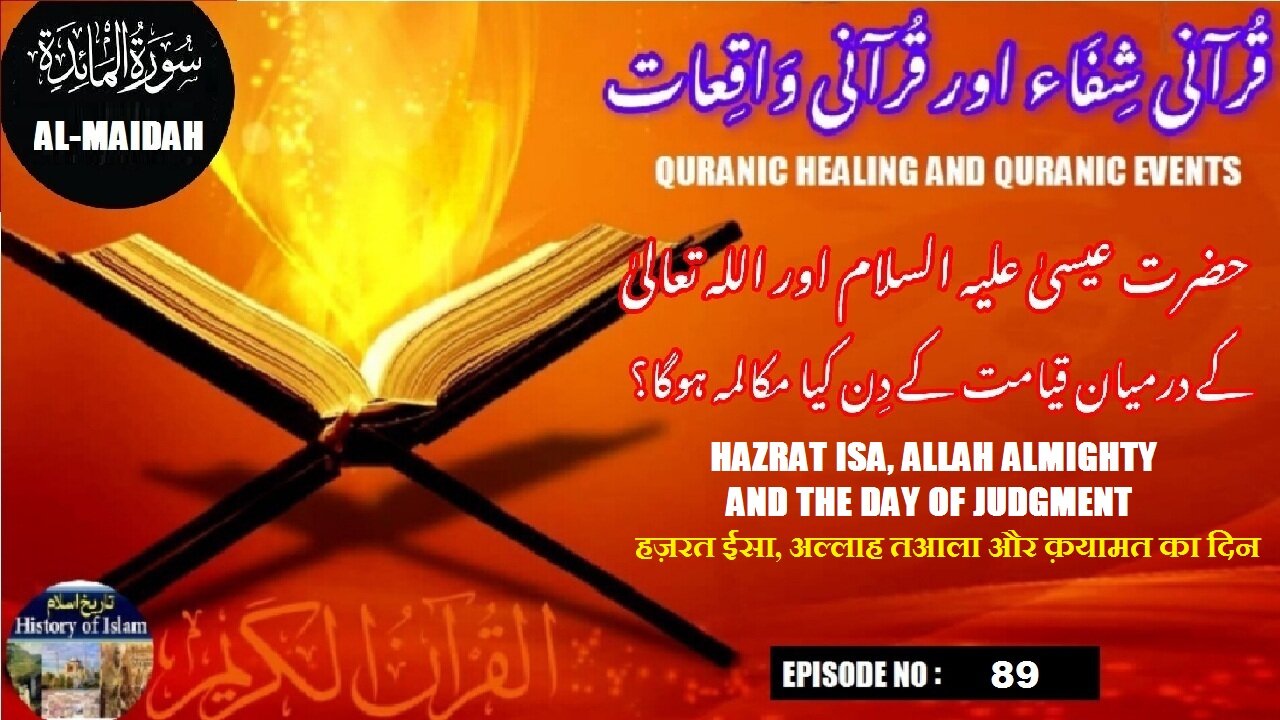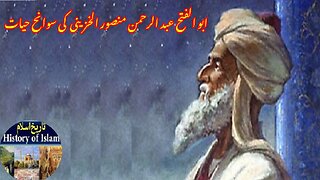Premium Only Content

Hazrat Isa, Allah Almighty and the Day of Judgment حضرت عیسیٰ علیہ السلام اللہ تعالیٰ اور روز قیامت
@islamichistory813 #healing #and #events #from #the #quran #historical #stories #and #events #quranicstories #selfhealing #success #stories #striking #events #in #history #quranstories, #storiesfromthequran #religious #creation #stories #trending #quran #short #historical #loves #historical #heroes #what #is #true #strength #calm #quran #recitation #for #babies #islamic #healing
"Jesus and Allah on the Day of Judgment: The Truth About Worship | Quran 5:116-118 Explained"
Brothers, sisters, friends and elders Assalamu Alaikum, wa Rahmatullahi wa Barakatuhu, we are presenting the 89th episode of the Islamic informative video based on healing and events from the Holy Quran, and in this video we will describe, "Jesus and Allah on the Day of Judgment: The Truth About Worship | Quran 5:116-118 Explained"
In Surah Al-Ma’idah, verses 5:116-118, the Quran introduces a powerful and pivotal moment that will unfold on the Day of Judgment: the dialogue between Allah and Jesus (Isa), peace be upon him. This conversation serves as a reminder of the responsibility and accountability of all prophets and their followers, as well as the crucial distinction between worshiping Allah alone and elevating any being, even a prophet, to divine status. The verses highlight a critical aspect of Islamic theology, specifically the rejection of the concept of deifying Jesus or his mother, Mary (Maryam). This moment is not just a theological correction but a significant revelation about the true nature of Jesus' mission, the relationship between Allah and His messengers, and the clarity of worship in Islam.
On the Day of Judgment, Allah will address Jesus directly, asking him an important question that brings to the forefront the misconception of some who mistakenly elevated Jesus and his mother to divine status. Allah will ask: "Did you tell the people to take you and your mother as gods besides Allah?" This question is profound, as it directly challenges the very heart of Christian doctrine, which, in many traditions, venerates Jesus and Mary to a status that transcends their human nature. It is important to note that in the Islamic understanding, Jesus is a revered prophet and a servant of Allah, not a divine being, and Mary is honored as one of the greatest women to have ever lived, but she is not worshiped.
The response of Jesus, as described in the Quran, will be clear and firm. He will deny ever instructing people to worship him or his mother. Jesus will state unequivocally that he only conveyed the message of Allah: that Allah is the only deity worthy of worship. He will declare that he was simply a servant and messenger of Allah, and he never commanded anyone to take him or his mother as objects of worship. In this moment, Jesus will completely dissociate himself from any false attribution of divinity, showing the distance between his actual mission and the human misinterpretations that arose over time.
Jesus' response, "Glory be to You! It was not for me to say what I had no right to say," emphasizes his humility and his full acknowledgment of Allah’s absolute sovereignty. By declaring this, he makes it clear that such an act would have been beyond his scope as a prophet. His mission was solely to guide people to worship Allah alone, and he did so with complete sincerity. This statement also reflects Jesus' own purity of faith and his total submission to the will of Allah. He was a human being chosen to convey the message of monotheism, not a divine figure deserving of worship.
The subsequent verses provide insight into the gravity of the Day of Judgment and the seriousness of this conversation. Allah will ask Jesus about his followers, especially those who have deviated from the true message. Jesus will have no knowledge of those who have distorted his teachings, and he will leave the matter to Allah, the true judge. This illustrates the concept of individual accountability in Islam. Each person is responsible for their own actions, and no prophet, not even one as esteemed as Jesus, can intercede on behalf of those who have strayed from the truth. This distinction between the role of the prophets and the ultimate authority of Allah is central to Islamic teachings.
The final part of the dialogue focuses on the fate of those who follow false beliefs, including those who worship Jesus or Mary. Allah will remind Jesus of the consequences of misguidance and the reality that those who engage in shirk (associating partners with Allah) will face severe consequences on the Day of Judgment. However, the faithful who adhered to the true message of monotheism will be rewarded. This distinction serves as a warning to all people, calling them to reflect on their beliefs and actions and to ensure that their worship is directed solely to Allah, the Creator of all things.
This dialogue between Allah and Jesus encapsulates the core teachings of Islam about the oneness of God (Tawhid) and the rejection of any form of polytheism or idol worship. It emphasizes the concept of accountability and the responsibility of every individual to uphold the truth, as well as the pivotal role of the prophets in conveying that truth. The conversation also serves as a moment of clarification, where the true nature of Jesus' mission is revealed — he was a servant of Allah, not a god, and his teachings were centered on the worship of the One true God alone.
The Quran’s portrayal of this dialogue provides a powerful reminder to believers that no prophet, no matter how exalted, has the right to be worshiped. The role of the prophets is to guide humanity to Allah, not to elevate themselves to divine status. This concept is reinforced by the humility and submission demonstrated by Jesus in the Quranic narrative. His refusal to accept worship and his disavowal of any such teaching reflect the purity of his mission and his absolute devotion to Allah.
In conclusion, the future dialogue between Allah and Jesus on the Day of Judgment, as outlined in Surah Al-Ma’idah, verses 5:116-118, underscores the essential Islamic principle of monotheism and the rejection of any form of divinization of human beings. It also reinforces the idea of individual responsibility and accountability, where each person must face the consequences of their beliefs and actions. This profound moment between Allah and Jesus serves as a critical reminder to all believers to adhere to the worship of Allah alone, to seek guidance from the true message of the prophets, and to avoid the pitfalls of false beliefs and idol worship.
With this, we ask for your permission until tomorrow and pray to Allah Almighty to grant us the ability to act on the Quran and Hadith, Amen
Allah Hafiz
==========================
-
 7:31
7:31
ISLAMIC HISTORY
2 days agoBiography Abu al-Fath Abd al-Rahman Mansur al-Khazini سوانح ابو الفتح عبد الرحمن منصور الخزینی
9 -
 LIVE
LIVE
LFA TV
12 hours agoKILLER CAUGHT LIVE PRESSER! - FRIDAY 9/12/25
5,816 watching -
 1:36:33
1:36:33
Dear America
3 hours agoBREAKING NEWS! Trump Announces Charlie’s Killer Is In Custody! DEATH PENALTY IS THE ONLY OPTION!!!
284K215 -
 1:45:41
1:45:41
Timcast
3 hours ago🚨PRESS CONFERENCE: Charlie Kirk Suspect In Custody | Tim Pool
134K165 -
 1:58:21
1:58:21
Badlands Media
8 hours agoBadlands Daily: September 12, 2025
57.8K10 -
 1:12:27
1:12:27
The Big Mig™
3 hours agoSenate Goes Nuclear ☢
9.99K8 -
 2:59:31
2:59:31
iCkEdMeL
3 hours ago $6.23 earnedBREAKING: Trump Says Suspect in Charlie Kirk Assassination Likely in Custody
57.8K30 -
 LIVE
LIVE
Times Now World
10 hours agoLIVE NEWS | Charlie Kirk's Final Debate 24 Hours Before Tragic Murder By Sniper in Utah Event!
279 watching -
 1:07:41
1:07:41
Crypto Power Hour
4 hours ago $0.01 earned2025’s Top-Rated Crypto Exchanges: Your Go-To Guide!
29.1K4 -
 4:29:28
4:29:28
The Bubba Army
1 day agoVideo Killed The Radio Star, RELEASE DAY! - Bubba the Love Sponge® Show | 9/12/25
172K10